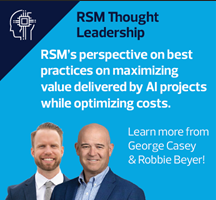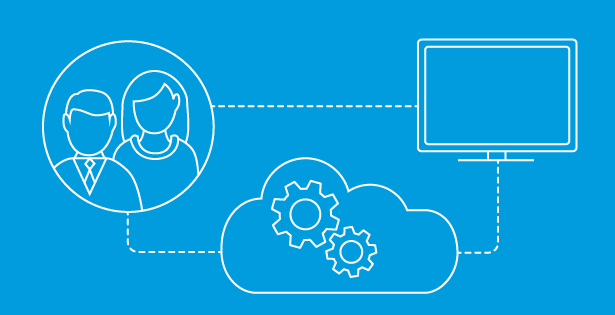AI Strategy: Laying the Groundwork for Success
Artificial intelligence (AI) has become a cornerstone for businesses aiming to enhance productivity, efficiency, and innovation. At RSM, our Management Consulting Technology Advisory team provides a comprehensive framework to guide clients through their AI journey. In this edition of AI Pulse, we delve into our AI strategy, assessment, and preparation phases, highlighting the value these services bring to our clients and the actionable insights for internal teams.
AI Strategy and Assessment: Building a Robust Foundation
AI Strategy Development: Our AI strategy begins with understanding the client’s unique business goals and aligning AI initiatives to drive value. We focus on creating a strategy that balances quick wins with long-term sustainable growth. This includes:
- Identifying high-impact use cases that align with business
- Quantifying potential financial benefits, such as cost savings, revenue growth, and risk
- Establishing governance frameworks to ensure responsible AI
AI Readiness Assessment: The readiness assessment is critical in evaluating the client’s preparedness for AI integration. We assess:
- Current state of data, IT, and operational
- Quality, availability, and accessibility of
- Organizational readiness for managing AI
AI Strategy and Assessment: Building a Robust Foundation
Process Design: We design AI processes that seamlessly integrate with existing systems by working collaboratively with clients to understand existing processes and future workflow developments. This involves:
- Creating detailed process workflows, identifying touchpoints and potential
- Understanding where the AI may be beneficial and bring value to existing business
- Ensuring compliance with data protection standards and industry-specific
Tool and Vendor Selection: Choosing the right AI tools is crucial for successful execution. We facilitate:
- Evaluating AI solutions, quantifying financial and operational
- Conducting vendor analysis to select the best-fit solutions for client
Revenue, Expense, Efficiency, and Quality: The Pillars of AI Value
RSM’s methodology around AI-driven value creation focuses on four key pillars:
- Revenue Generation – AI can unlock new growth opportunities through:
- Personalized customer engagement: Tailoring interactions to enhance customer experience and loyalty.
- Upselling and cross-selling: Implementing dynamic pricing models to maximize
- Expense Reduction – AI helps in reducing costs through:
- Process automation: Minimizing manual tasks to save labor
- Efficient resource management: Optimizing IT infrastructure and energy
- Efficiency Gains – Enhancements in efficiency are achieved by:
- Speeding up decision-making: Leveraging AI-driven insights and
- Improving supply chain management: Reducing delays and optimizing inventory
- Quality Improvement – AI enhances quality by:
- Reducing error rates: Ensuring accuracy in data handling and process
- Enhancing product development: Accelerating time-to-market for new
Framework Process: A Step-by-Step Journey
To ensure the successful adoption of AI, RSM follows a structured framework process:
- Education and Awareness: At the initial stage, we focus on raising awareness and educating business and technical leaders about the potential of AI within their operations.
- Strategy and Roadmap Development: We work with clients to develop a tailored AI roadmap, identifying strategic use cases and creating a clear plan for AI integration.
- Data and Process Preparation: This phase involves preparing the data and refining processes to ensure a smooth AI implementation. We emphasize data governance and security.
- Execution and Implementation: Our team oversees the AI implementation, including bespoke development and software deployment, with attention to change management and process
- Ongoing Support and Maintenance: Post-implementation, we provide continuous support and maintenance to ensure the AI solutions remain effective and up-to-date.
Contact the team for more information: Justin Mazza (justin.mazza@rsmus.com), Steven Co (steven.co@rsmus.com), Marc Bien-Aime (marc.bienaime@rsmus.com), Stephanie Anielski (stephanie.anielski@rsmus.com)

 RSMUS.com
RSMUS.com


